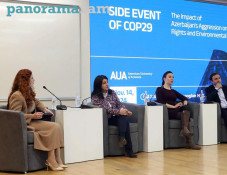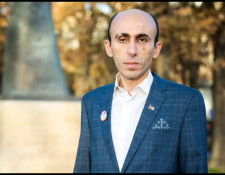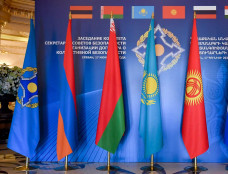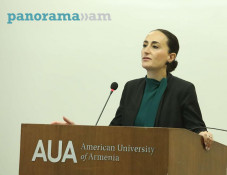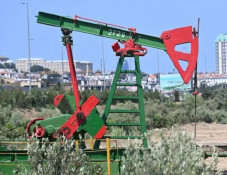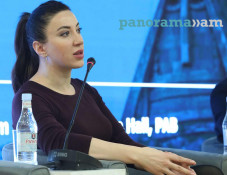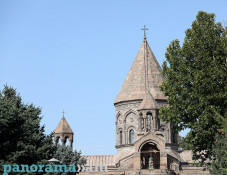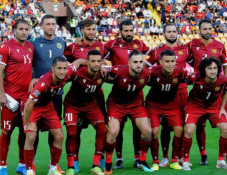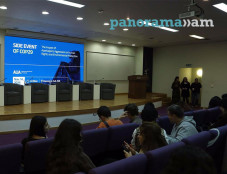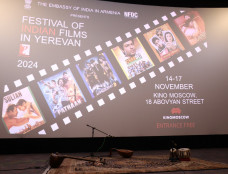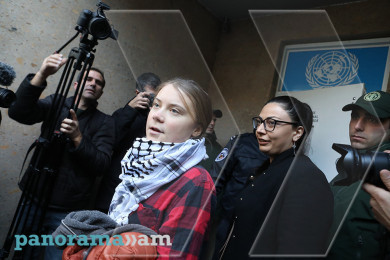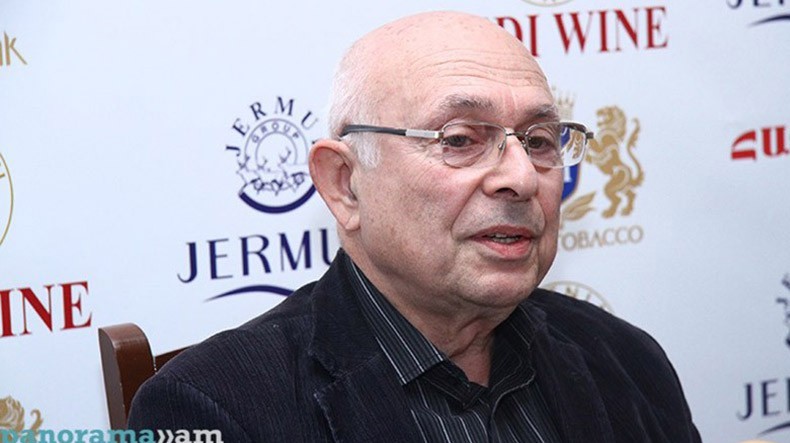
Rouben Galichian exposes myth of ‘divided Azerbaijan’ and Azerbaijani scientists’ falsifications of sources
One of the propagandistic aims of the Azerbaijani scholars and authorities is to prove the reality of the terms ‘Southern Azerbaijan’ and ‘Northern Azerbaijan,’ and their centuries long history. The use of these invented terminologies targets the annexation of the Iranian province of Azerbaijan, Atrpatakan, with the Republic of Azerbaijan. An analysis of the concepts ‘Northern Azerbaijan,’ ‘Southern Azerbaijan’ and ‘Western Azerbaijan,’ a name applied for Eastern Armenia, is provided by famous cartographer Rouben Galichian in his book Historical and Geographical Falsifications of Azerbaijan, a historical, cultural and cartographical research based on a detailed analysis backed by documentary evidence.
After post-Soviet independence, the use of the terms and acceptance of them has become commonplace, meaning that this example of Azerbaijani propaganda has partially succeeded, at least so far as the nation’s public is concerned, Galichian writes.
According to some Azerbaijani historians, Azerbaijan was divided into southern and northern parts in 1813 and 1828, when the khanates situated to the north of the river Araks went to Russia and Atrpatakan remained in the territory of Iran under the treaties of Gulistan and Turkmanchay, Galichian writes.
He unmasks Azerbaijani academician Ziya Buniatov’s falsifications, according to which these terms are not 180-years old but rather 1,400 years. Galichian highlights a number of ‘gross mistakes and deliberate falsifications’ in one paragraph alone. He cites Buniatov to make his point clear: “According to collections of historical maps, since the sixth century CE the name Azerbaijan could be used for both Northern and Southern Azerbaijans. During the sixth century the Sassanid king Khosrow Anushirvan created the ‘Caucasian Knot’ group of countries, called ‘Abdulbadahan’ [sic.] or, according to the Arab-Persian tradition, ‘Azerbaijan’, which, among others, included the countries of Northern Azerbaijan or Arran and Southern Azerbaijan or Atropatene. According to the Arab and Persian sources, since the age of the Caliphate and onwards, i.e. the eighth century, the name ‘Azerbaijan’ came to be understood as both Northern and Southern Azerbaijan, and refers to their administrative, geographical or political systems.”
Next, Galichian sets on a step-by-step unmasking of the Azerbaijani historian’s falsification. He points out that no 6th century Islamic historical and geographical literature exists as the religion Islam appeared in the 7th century. “It is not known from where Buniatov and his friends have discovered these sixth-century sources, particularly the geographical ones. The oldest Islamic historical or geographical document dates from the ninth century, hence the maps mentioned by Buniatov are those prepared by himself and can hardly be used as a basis for his arguments. As regards other maps of the period, no western map from that period shows Azerbaijan, which was then unknown to western cartography,” he writes.
Further, Buniatov intentionally distorts the name Atropatene or Atorpatkan into ‘Abdulbadahan,’ a name unfamiliar to Arab (and probably any other) sources. In either case, it was the Iranian province by the name Atropatene that was known to historians since the dawn of our era, Galichian writes.
In Islamic documentation that has reached us since the ninth century, particularly the geographical works of Balkhi, al-Istakhri, Ibn Hawqal, al-Mas’udi, al-Idrisi, al-Qazvini and others, the territory north of the Rivers Kura and Araks is named ‘Arran,’ that is, Albania, and that south of the river Araks is named ‘Azerbaijan’.
In the old and medieval Islamic geographical and historical literature, the terms Northern and Southern Azerbaijan or any words to that effect have never existed, Galichian writes and argues that Buniatov implements falsifications in an attempt to impose the political and administrative statehood of Azerbaijan upon a territory stretching from Derbend to Hamadan.
“It is hard to believe that Buniatov was not knowledgeable of the Arab historical and geographical sources and was not aware of the epoch described in them. This obvious and gross falsification made in the frameworks of political propaganda is inexcusable for him as a scientist, academician and deputy director of the National Academy of Sciences of Azerbaijan,” Galichian writes.
Further, he notes that in 1986, Buniatov and his student academician Farida Mamedova wrote in their studies that the area of Albania remained unchanged from the first century BCE until the eighth century CE, and that it covered almost all of the territory of the present-day Republic of Armenia including the regions of Siunik, Sevan, Yerevan, Echmiadzin, as well as Nakhijevan, Artsakh, Utik, Kapalak (Qabala – ed.), Shaki, Cambusena, southern Georgia and the north-western regions of Iran. “During a conference entitled ‘The Ethnocultural Heritage of Caucasian Albania,’ which took place in 2001 in Baku, in her presentation Mamedova further extended the above period from third century BCE to the eighth. As on previous occasions, her references were to her own specially designed maps of the region,” he points out.
The Azerbaijani academician Igrar Aliyev regularly mentions ‘Northern,’ ‘Southern’ and ‘Western’ Azerbaijan in his A Brief History of Atropatene. He sets out to prove that the forefathers of the population of the Republic of Azerbaijan are the Medes and the people of Atropatene. He notes that according to Arab historians, the languages and dialects spoken in ‘Southern Azerbaijan’ during the early medieval period were Azari, Pahlavi and Persian. In the following paragraphs he continues, ‘According to Mas’udi the language of Southern Azerbaijan was Azari,’ deliberately adding the adjective ‘Southern’ to Mas’udi’s written text. Not content with this rewriting, he adds that ‘the Arab geographers Ibn Hawqal, Yaqut and Baladhuri are also of the same opinion’, in contradiction of the fact that neither in the works of all these scholars, nor in the Islamic cartography of the period before the 20th century, the terminology ‘Southern’ or ‘Northern Azerbaijan’ is to be found, Galichian points out.
Galichian writes that some western historians have now fallen into the trap and used these invented names in their works, while using the inventors of this terminology as their sources. One of these victims is the American historian Audrey Altstadt, who uses Buniatov’s assertion concerning the use of Southern and Northern Azerbaijans in ‘sixth-century’ Arab literature in her The Azerbaijani Turks.
“It is not excusable for the American historian to use mostly secondary Azerbaijani and several Russian sources – which are translations rather than originals – without taking into consideration the fact what deliberate omissions and falsifications the Azerbaijani academicians and scientist make in their translations, such as leaving out names, paragraphs, and even whole chapters about the Armenians and Armenia from the texts,” Galichian writes.
According to the Iranian historian Touraj Atabaki, the tradition of the attempts to write an invented history of the Turkic people of Azerbaijan continued in the studies on Azerbaijan’s history published after Joseph Stalin’s death. “According to the authors of this kind, from antiquity the region of Azerbaijan has been the homeland of particular Turkic tribes. Another example, which demonstrates the attempt to exploit simple geographical terms in order to invent historical legitimacy, is the use, in certain intellectual circles both in Iranian Azerbaijan and in the former Soviet Azerbaijan, of phrases such as Shumali (northern) and Junubi (southern) Azerbaijan, to designate the regions north and south of the Araxes River. It is obvious that what lies behind this choice of terminology is the desire to proclaim the cultural homogeneity in both geographical areas, with the implied call for unification of Iranian Azerbaijan with the present-day Republic of Azerbaijan,” the historian writes as cited by Galichian.
Further, Galichian refers to the name ‘Western Azerbaijan’ and to the ‘Azerbaijanisation of Siunik.’ To justify this, the Azerbaijanis reference maps prepared in the Russian Empire in the middle of the 19th century, where the territories of Armenia and Azerbaijan are shown divided into the Russian provinces of Erivan, Baku and Elizavetpol, the latter taking up Karabakh and most of Siunik. “However, when these divisions are mentioned by the Azerbaijanis the reasoning behind this unusual division is never discussed,” Galichian writes.
According to him, the main reason was that after the Treaty of Gulistan in 1813, much of the territory north of the River Araks, including Shirvan, Talish, Shamakhi, Karabakh and Zangezur provinces, was included in the Russian province of Elizavetpol, while the rest of Armenia was transferred to Russia via the Treaty of Turkmanchay in 1828, some fifteen years later. At this time, the Russian administrators did not bother to rearrange the provinces but kept the borders as drawn in 1813. Thus, the territory of Armenia proper was divided between two different Russian provinces, which were named Erivan and Baku provinces in 1840 without their internal borders being changed.
“In the past, ‘Western Azerbaijan’ was sometimes mentioned in Azerbaijan’s pseudo-scientific propagandistic literature but its borders were not clearly defined. They became apparent when the Ministry of Tourism and Culture of Azerbaijan published The Monuments of Western Azerbaijan,” Galichian writes.
To be continued.
Born in Tabriz, Rouben Galichian is a descendant of refugees from Van who survived the Genocide. He received scholarship and studied engineering at Aston University, Birmingham (UK). Since in 1981, he started to study the rich cartographical heritage in the libraries of the UK and other European countries. His first research, Historic Maps of Armenia (in English), was published in 2004. It was a collection of maps from various libraries and museums in the world, where Armenia was noted, beginning from the 6th century to the present times. His second book, Armenia in World Cartography, was published in Yerevan in 2005. The research ‘Countries South of the Caucasus in Medieval Maps. Armenia, Georgia and Azerbaijan’ (in English and Armenian) was published in 2007. The book The Invention of History (in English) was published in 2009.
In his book Historical and Geographical Falsifications of Azerbaijan, published in 2013, the author details the reasons, aims and methodology of the falsification of the history of Azerbaijan and the countries of the region.
Related news
- Rouben Galichian exposes Azerbaijani historiography’s contradictions to sources and even its own theories
- Rouben Galichian: Azari is Iranian dialect, Turkic language was introduced in region of in C11 with nomad Oghuzes
- Rouben Galichian: For Azerbaijani historians, issues of their people’s origin are flexible and alterable theories
- Rouben Galichian: Ziya Buniatov played key role in setting ground for conducting anti-Armenian propaganda in Azerbaijan
- Rouben Galichian: Falsification of Azerbaijan’s history begins from school textbooks and youth believes in that lie
- Historical and Geographical Falsifications of Azerbaijan. Rouben Galichian argues on aims of appropriating others’ history
Newsfeed
Videos





